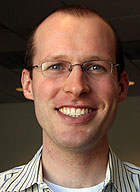Last year, Chuck Rickert, a fifth-year student in the M.D./Ph.D. program at the School of Medicine, heard a show about kidney donation on National Public Radio’s “Talk of the Nation.” One of the callers, a man in his 50s on dialysis, said his blood type did not match any friends or family, and his only option for a new kidney was to wait for something bad to happen to a younger person.
The distressed man’s call stuck with Rickert.

Rickert
“I guess it really put a face on the issue for me,” he said. “I started researching the risks of donating a kidney and realized that they were small compared to the great need for donation.”
Rickert determined that the risks, such as bleeding and infection, are similar to those involved with any major surgery. He also found that kidney donation does not change life expectancy or increase a person’s risks of developing kidney disease or other health problems.
Rickert’s parents and sister were a little taken aback when he brought up donating, but they soon became supportive of his decision. He then underwent medical and psychological testing through Mid-America Transplant Services and the Second Chance Program, both in St. Louis.
Six months later, in July 2008, Rickert donated a kidney to a 10-year-old girl who lives in Montana. She was born with hyperoxaluria, a disease that eventually causes kidney failure. Rickert was a nondirected donor, someone who donates anonymously and doesn’t know the recipient.
His surgery and recovery went smoothly, and Rickert was back at work in the laboratory of Robert D. Schreiber, Ph.D., the Alumni Endowed Professor of Pathology and Immunology, a week-and-a-half later.
He said he has no regrets about donating a kidney.
“But it’s a decision people need to come to on their own after discussing the donation with the important people in their lives,” Rickert said. “In talking about my experience, I’d love for people to think more seriously about donating.”
Kidney donation is not the first act of altruism for Rickert. He volunteered with emergency medical services in New Orleans and Paris while in school at Tulane University and the Sorbonne. And between graduating from New York University with a degree in philosophy and beginning at Washington University School of Medicine, Rickert spent most of a year working at a children’s health clinic in Port Au Prince, Haiti. The home is run by an order of nuns started by Mother Teresa.
“Service to the community was a major aspect of my childhood, and my parents led by example,” Rickert said. “Service to others also was important to me in choosing a career.”
Rickert’s father is an administrative law judge with the Social Security Administration in Peoria, Ill., and his mother is director of family preservation and support services at the Children’s Home Association of Illinois.
Rickert also is a teaching assistant in the first-year physiology course. Coursemaster Robert S. Wilkinson, Ph.D., recently asked him to deliver a full lecture about kidney transplantation in his class.
“Chuck is the first student to whom I’ve entrusted a lecture presentation to the entire medical school class, and he did a great job,” Wilkinson said.
“I can’t say enough good things about Chuck. He is one of those rare students who’s so mature and exceptional that he seems more like a colleague than a student,” he said.